#Tea Recipes
Explore tagged Tumblr posts
Text
some tea recipes
if you like tea rituals or giving tea offerings, then this post is for you! keep in mind, though, DEFINITELY do your research on any of the herbs/plants I've listed here if you've never put them in your body before. there's no harm in making substitutions or omitting certain things for the sake of your own health. i've gone ahead and highlighted some herbs that have potential side effects (although not everything i've highlighted may effect you, and not everything i haven't is for sure safe).
also, all of these teas can be made with one of those little tea strainer balls, or with a good mesh sieve. either way, have some way of removing the mix after it's steeped, because over-steeped tea can get sour. store any leftover tea mix in an airtight container in a cool, dry place
if you need to replace any fresh ingredients with dried, divide the quantity in half. also, some of the floral teas will seem like it's a lot of mix just for one cup, but petals just aren't as strong as leaves/roots/etc.

CLEAR SKIES TEA
Ingredients: 1/2 cup dried peppermint, 1/4 cup marigold petals, 2 stalks of finely chopped lemongrass, 2 tsps orange zest, 1 tsp ground ginger Extra Instructions: steep for 10 minutes, use 1-2 tsps for 1 cup
EVERYDAY MORNING TEA
Ingredients: 1 rooibos tea bag, a thin slice of lemon/or a little bit of juice, two thin slices of ginger, 3 cloves (or 3/4 tsp of ground clove), top with a few lemon balm or spearmint leaves after steeping Extra Instructions: steep for 10 minutes to make 1 cup
COTTAGE TEA
Ingredients: 1 cup earl grey leaves, 1/4 cup dried lavender, 2 tbsps each of cornflower and sunflower petals, add a couple vanilla seeds or extract in each cup Extra Instructions: steep for 3 minutes, use 1-2 tsps to make 1 cup
GROUNDING TEA
Ingredients: 2 tsps/1 bag of black tea (assam or darjeeling is best), 2 tsps/1 bag of chamomile tea, 2 tsps elderflowers, add a pinch of lemongrass and a few vanilla seeds/a couple drops of extract to each cup Extra Instructions: steep for 10 minutes, makes 2 cups
CALMING TEA
Ingredients: 1 cup lemon balm leaves, 1/2 cup valerian root (I use lavender instead), 1/2 cup rose geranium petals, 1/2 cup chamomile flowers, 1/2 cup comfrey leaves (or nettle leaf) Extra Instructions: steep for 10 minutes to make 6 cups
GODDESS TEA
Ingredients: 1 tsp each of hibiscus petals, marigold petals, rose petals, and thyme leaves Extra Instructions: steep 5 minutes, makes 1-2 cups
TEA FOR FAIRIES
Ingredients: 2 cups dried chamomile flowers, 1 cup green tea leaves, 1 cup lemon balm leaves, 1 cup calendula, 1/4 cup of rose petals Extra Instructions: steep for 10 minutes, use 2 tsps to make 1 cup
DANDELION DIVINATION TEA
Ingredients: 1 tbsp fresh dandelion petals (although you can use the full flowers), 1 tbsp fresh marigold, top with a lemon/orange slice after steeping Extra Instructions: steep for 5 minutes to make 1 cup
ROSE VERBENA TEA
Ingredients: 1 cup Chinese green tea, 1/2 cup rose petals, 1/4 cup dried lemon verbena leaves Extra Instructions: use 1-2 tsps for 1 cup. steep for anywhere from 3-10 minutes (3 is best for the tea, 10 is best for flowers)
FULL MOON RITUAL TEA
Ingredients: 2 tsps dried elderflower, 2 tsps dried lavender, 1 jasmine tea bag, 1/2 tsp dried yarrow leaves (or can use elderflower), 3 crushed cardamom pods Extra Instructions: steep for 5 minutes, makes 2 cups
GREEN SPIRIT TEA
Ingredients: 2 tsps/1 bag green tea, 1 tbsp dried rose petals, 1 tsp each dried dandelion petals and dried nettle Extra Instructions: steep for 10 minutes, makes 2 cups
APOTHECARY'S BREW
Ingredients: 2 cups dried echinacea, 2 cups dried chamomile flowers, 1 cup dried mint leaves, 1 cup dried anise seeds, 1 cup dried thyme leaves Extra Instructions: steep for 10 minutes, use 1-2 tsps for 1 cup
ROMANTIC TEA
Ingredients: 2 tsps/1 bag white tea, 4 tsps rose petals, 2 tsps each raspberry leaf and lemon balm leaves (can substitute jasmine and mint for these), add a couple vanilla seeds/drops of extract in each cup after steeping Extra Instructions: steep for 5 minutes, makes 2 cups
MAGIC REALISATION TEA
Ingredients: 1/2 cup dried borage flowers, 1/2 cup dried thyme leaves, 1/4 cup dried dandelion, 1 tsp each fennel seeds and ground coriander, 1/2 tsp ground ginger Extra Instructions: steep for 10 minutes, use 1-2 tsps for 1 cup
FAIRY CIRCLE TEA
Ingredients: 2 cups dried chamomile flowers, 1 cup dried lemon balm or mint leaves, 1/2 cup dried calendula petals, 1/4 cup dried rose petals Extra Instructions: steep for 5 minutes, use 1 tbsp for 1 cup
JASMINE JOY TEA
Ingredients: 4-5 jasmine tea bags, 2 tbsps each lemon balm leaves and rose geranium petals, top with a few sprigs of mint and a slice of lemon after steeping Extra Instructions: steep for 10 minutes, makes 5-6 cups
AURORA TEA
Ingredients: 1 oolong tea bag, 1 tsp dried cornflower, 1/2 tsp dried peppermint leaves Extra Instructions: steep for 5 minutes, makes 1 cup
KINDRED SPIRITS TEA
Ingredients: 2 cups dried thyme, 1 cup dried rosemary, a few cloves, 3 ground/torn up bay leaves, 1 star anise, the dried rind of a small orange Extra Instructions: steep for 10 minutes, use 2 tsps for 1 cup

abridged from "Enchanted Tea Time" by Gail Bussi (a bunch of these recipes I changed to be a little easier to do for the average person, or provided alternatives for a "risky" ingredient)
#pagan#paganism#polytheist#polytheism#witchblr#witchcraft#witch#magic#magick#divination#tea spells#tea recipes#tea magic#tea#tea recipe#pagan witch#witch stuff#witches#paganblr#pagan community#eclectic pagan#eclectic witch#eclectic wicca#spell#spellcasting#spellwork#spellcaster#spellcraft#grimoire#spells
96 notes
·
View notes
Text
Jar tea 罐罐茶 from Gansu and Shaanxi provinces.
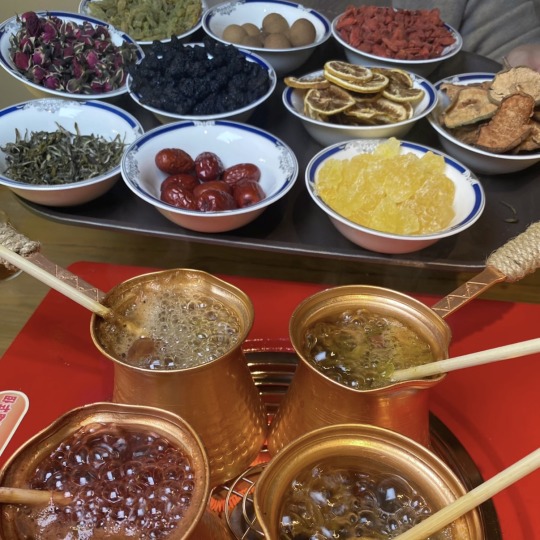
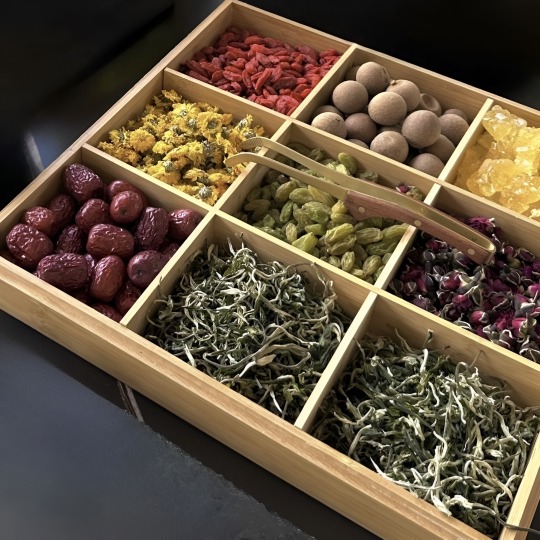
#china#🇨🇳#tea#chinese tea#herbal tea#Gansu#Shaanxi#gansu province#Shaanxi province#northwest China#northwestern China#chinese food#chinese cuisine#chinese culinary#chinese#authentic chinese cuisine#authentic chinese food#floral tea#black tea#green tea#tea recipe#tea recipes#traditional tea#Traditional Chinese tea
25 notes
·
View notes
Text
Kitchen Witchery: Elminx's Anti-anxietea

In honor of eclipse season, I wanted to share a recipe to bring your buzz down a notch (or two). I've been drinking this nervine tea for nearly five years now; it features all of my favorite herbal flavors! I'm not going to go into detailed herbal profiles for each of these botanicals, but I suggest looking into them more if you are curious. I think learning the basics of herbalism can greatly benefit the kitchen witch.
Each of these ingredients can be found in any decent grocery store, bought online, or grown yourself. The combination is designed with flavor and herbal actions in mind; it's not a measure of exact ingredients - mix with your heart. All of these botanicals are well tolerated and can be drunk regularly by most people. Please be careful when trying new herbs; allergic or other adverse reactions can occur.

Hibiscus, Hibiscus sabdariffa Hibiscus is the primary flavoring agent in this blend. It gives our tea its Cool, Moist, and Sour properties. Please keep in mind that hibiscus will stain anything it comes into contact with, including clothing, wooden spoons, and even countertops. If you don't think you're familiar with hibiscus, it is the primary flavor in all "Zinger" teas. It tastes tart and inexplicably red.
Peppermint, Mentha piperito
Peppermint is the first of our gentle nervines to be added to our tea. Nervines do exactly what you expect them to: they calm your nerves. In addition to being a nervine (primary benefit), Peppermint adds its properties of Pungent, Sweet, Cool, Warm, and Dry to our tea. I'm sure you're all familiar with peppermint; you could probably substitute a different mint here with similar effect.
Lemon Balm, Melissa officinalis
Lemon balm is a nervine and a mild sedative. It brings the properties of Sour, Cool, and Dry to our tea. Some people don't like the taste of lemon balm, saying that it tastes like Pledge. If that's you, just omit it from this drink. The taste of hibiscus strongly overpowers the lemon balm, though, so maybe try it first.
Tulsi (Holy Basil), Ocimun santum
Tulsi is a nervine and adaptogenic herb, which means that it helps the body manage stress better. Its properties are Pungent, Sweet, Bitter, and Warm. With its heady, peppery notes, Tulsi is certainly an acquired flavor. If you get along with this herb, you will know almost immediately upon drinking it for the first time. A little goes a long way; you don't need to overdo it.
Dried Apple, Malus sp.
Although apple is primarily a flavoring agent (and sometimes a sweetening agent) in this blend, it does have mild sedative effects that lend themselves to the overall feel of this tea. I suggest using the apples you would eat in this recipe; you can dry slices of apples by putting them in your oven at 225F for 1.5 to 2 hours. Use a sweeter apple if you want a sweeter tea.

Minx's Anti-Anxietea
2 parts hibiscus
1 part peppermint
1 part lemon balm
1-2 parts dried apple
.5 part tulsi
Start by adding 1 tsp tea to hot water and steeping for 8 minutes. Adjust to your tastes from there.
This drink tastes great, hot or cold.
I've never sweetened this tea because I like my drinks bitter like my soul, but I bet a dollop of honey would be lovely in this—especially a nice summery wildflower honey. I've added sweetened cranberries in the past (1-2 parts) for more sweetness. And honestly, I don't measure. I know when it smells right.
I apply this drink liberally, but some people may find it too strong a diuretic to consume more than once daily. I drink it any time that I feel especially anxious or when I know I am going to be under a lot of stress. My partner likes to drink it before bedtime and claims it's one of the only things that will calm them down when they feel like they have too many thoughts.
You can witch this up (it's a verb now!) as little or as much as you like. I like to work calming energy into the drink step by step as I create the mixture by working with each botanical individually. You could charge this with a candle or sigil, dedicate it to one of your favorite gods or spirits, or store it on your altar. I create bindrunes for my favorite tea blends and use them as magical labels.
Do you like my work? You can tip me over on Kofi or sign up to be a monthly supporter of my writing.
64 notes
·
View notes
Text
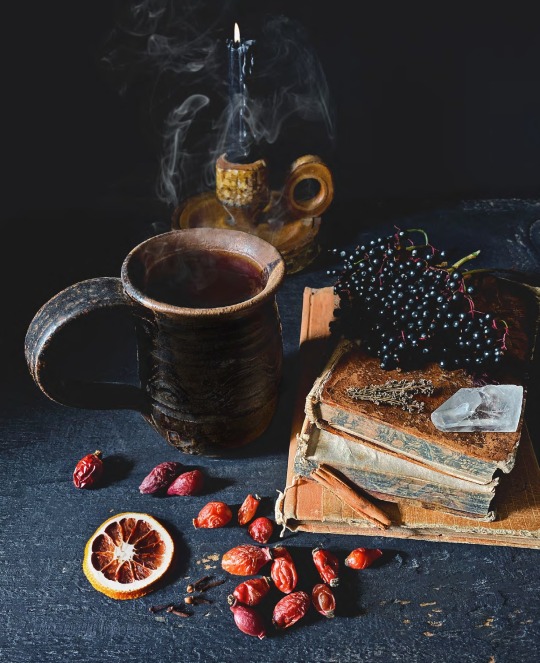
Samhain Tea Ritual
By Whisper in the Wood
It is fall, and deep in the ancient groves of the enchanted wood, a woman gathers earthy roots and plump, fragrant mushrooms. She places them in her basket beside wild ruby-red rose hips, juicy dark-purple elderberries, and silvery mugwort gifted by the hedges.
Her hooded woolen cloak brushes against the soft ferns that line the path over spongy moss and pine needles as she makes her way home. There, at the edge of the wood, her small stone cottage is surrounded by goldenrod and purple aster swaying in the breeze. A black cat in the doorframe mews, eagerly awaiting her return.As the teakettle heats over the hearth fire, she crafts a Samhain tea blend with the flora and fungi she’s foraged in the wood. This autumnal tea ritual honors the bounties of harvest time and celebrates the Triple Goddess, who now begins her seasonal transformation from Mother to Crone. The spirit ancestors whisper to her from beyond the veil, which is at its thinnest this time of year.
Join her and the collective of ancestors who came before you by putting together your own Samhain tea ritual celebrating and honoring the vibrancy of autumn, the abundant gifts of the harvest, and the deep love given to and received by one’s ancestors in spirit.
KEEP READING AND GET THE RECIPE HERE
#Samhain Tea Ritual#Autumn Tea#Herbal Tea Blend#Seasonal Tea#Fall Rituals#Triple Goddess#Ancestor Connection#Pagan Traditions#Druid History#Harvest Tea#Samhain Celebrations#Tea Recipes#Autumn Harvest#Magical Tea#Witchcraft Tea
23 notes
·
View notes
Text
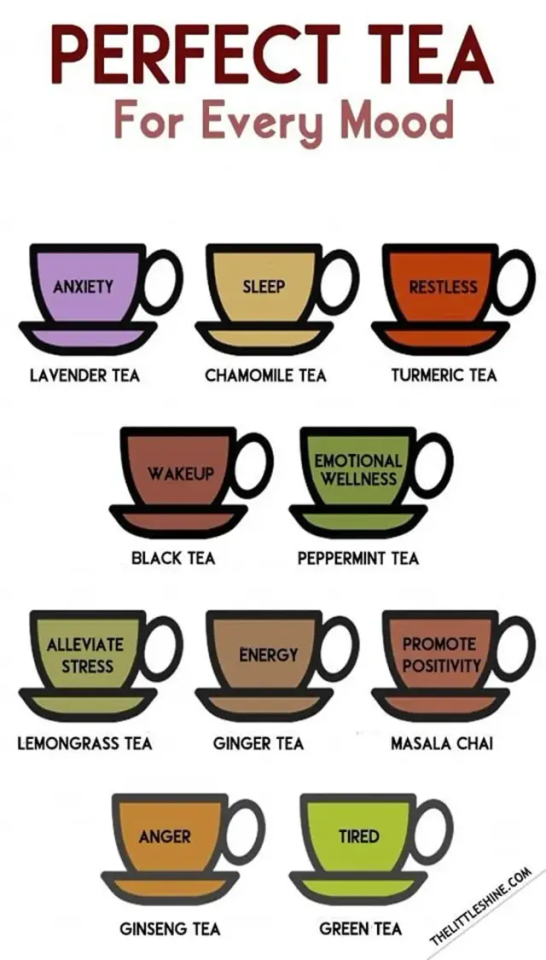
#khajiit metaphysical#not mine#stolen from facebook#witchblr#witchcraft#cottagecore#witchcore#witch#tea recipes#tea#herbs#herbal witch#kitchen witch#potions
127 notes
·
View notes
Text
Strawberry Tea Recipe
Serves 12 Ready in 15 mins Prep time 15 mins 30 calories per serving Ingredients > 2 cups fresh strawberries > 1/4 cup fresh lemon juice > 5 cups unsweetened brewed tea, chilled > 1/3 cup sugar > Additional fresh strawberries for garnish, sliced Steps Place strawberries and lemon juice in blender; cover and puree. Pour puree into a 2-quart pitcher and add the tea and sugar; stir until…
4 notes
·
View notes
Text

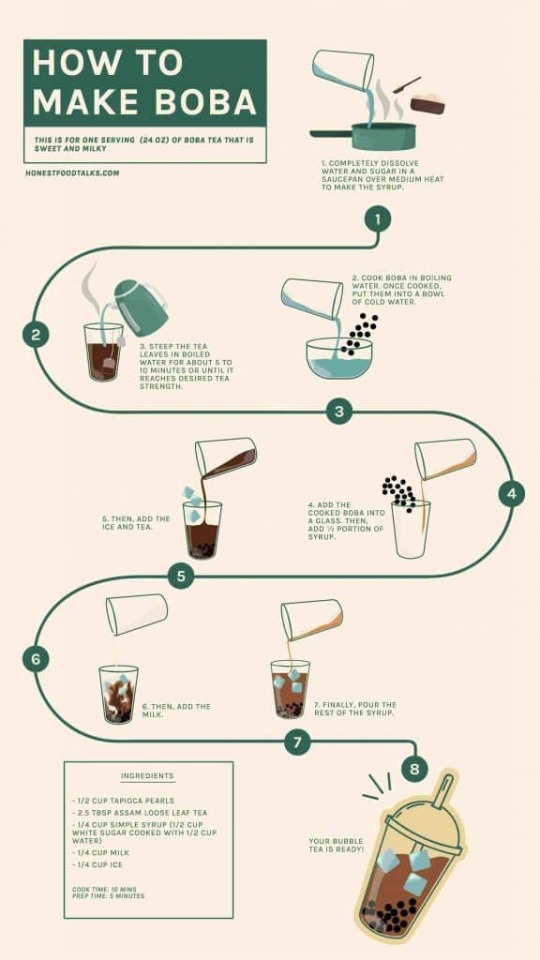
#boba#witchcraft#kitchen witch#green witch#tea#witch community#witchyvibes#witchblr#witchy recipes#tea recipes#witchy tips
38 notes
·
View notes
Text
Earl Grey Mascarpone Shortbread Cookies
Quite the Stir is thrilled to share this delightful Earl Grey Marscapone Shortbread Cookie recipe, courtesy of one of our talented readers. Could this be your new favorite treat? One bite and you’ll understand the appeal. Nutritional information may vary. Enjoy guilt-free(ish) Yields: Approximately 24 cookies Ingredients: For the Shortbread: 1 cup unsalted butter, softened 1/2 cup powdered…
#desserts#Mixology Classes#Quite The Stir#Quite The Stir Tea and Spice Company#Recipe#shortbread#Spices#tea recipes
2 notes
·
View notes
Text
I just accidentally made un-tea?????
I made green tea, but I forgot there was an old bag of chai in the kettle, so I mixed chai water with decaf green tea, then I mixed in like a half table spoon or something of that honey from the dollar store that they aren't legally allowed to call honey because there's too much corn syrup in it and some almond milk and a single drop of coffee creamer because we ran out and???? It tastes like??? Nothing????
It has LESS flavor than my tap water! HOW do you EVEN-
I think I made a flavor that's only perceptible to shrimp, that's the only explanation
47K notes
·
View notes
Text
Iced Tea: A Refreshing Summer Beverage

Origins and History of Cold tea Cold tea has its roots from the early 19th century when it was introduced in the United States. Tea drinking was a common British tradition which was brought to America by early settlers. In the hot summers of the southern United States, people started consuming unsweetened brewed tea that was poured over ice cubes to keep it cool. This is considered as one of the earliest records of cold tea being consumed in America. The tradition continued to grow and cold tea became a signature summer drink across the country.
Preparing Traditional Unsweetened Cold tea
Traditional unsweetened cold tea is prepared by brewing black tea leaves in hot water. For each quart of water, use one tablespoon of loose black tea leaves or three tea bags. Bring the water to a boil and then remove it from heat. Steep the tea for 5-7 minutes to extract maximum flavor. Iced Tea Once brewed, pour the tea through a strainer into a pitcher filled with ice. For a stronger tea flavor, you can steep it for a bit longer. Add lemon slices or fresh mint leaves for extra flavor. Simple syrup or sugar can also be added according to taste preference but traditionally unsweetened tea is served without any added sweeteners.
Variations with Herbal Teas and Flavored Syrups
While black tea is most commonly used, people have gotten creative with various tea varieties and flavors. Herbal teas like hibiscus, sage and rooibos offer fruity and aromatic flavors when brewed and served over ice. Fruit-flavored simple syrups infused with oranges, berries or peaches add natural sweetness and taste. Passion fruit, mango and lychee syrups have become quite popular flavor choices in recent times. Matcha green tea is another option that is gaining popularity for its rich texture and intense flavor when iced. Experimenting with different tea varieties and flavors allows one to discover new preferences.
Cold tea in Popular Culture
Across the United States, sweet Iced Tea has become embedded in popular culture and is associated with the South. It is commonly served at restaurants alongside meals in pint glasses filled to the brim with ice. The beverage is prominently featured in Southern comedy films and television shows depicting hot summer days. Lipton Brisk and Arizona are some of the major mass-produced brands of sweet tea available nationwide in bottles and cans. While unsweetened tea may have been its origins, it is now more commonly enjoyed sweetened and served abundantly cold like a soft drink. Cold tea permeates cultural depictions of Southern culture and lifestyle.
Decorating and Presenting Iced Tea
beyond the basic tea, ice and glass, a bit of creativity can make cold tea more appealing and fun to drink. Rip up fresh mint leaves and scatter them gracefully over ice cubes before pouring tea for an invigorating aroma. Slice fruits like oranges, peaches, watermelon or berries directly into glasses filled with tea and ice for an instant infusion of flavor. Citrus wheels or slices look lovely floating on top. Garnish rims of glasses with sugar or cinnamon for added texture. Consider using glass tea jars, Mason jars or pitcher to serve cold tea communally for decorative appeal. Presentation elevates the humble beverage as a refreshing drink that is also an experience for the senses.
Health Benefits of Drinking Cold tea Regular consumption of cold tea, especially when prepared with black or herbal varieties, provides notable health advantages. Tea contains powerful antioxidants called polyphenols that protect cells from damage. One of the main polyphenols is flavonoids like catechins which studies suggest may reduce risks of chronic diseases. Cold tea hydrates the body in summer while infusing it with antioxidants. Black tea has been linked to boosting metabolism, reducing inflammation and protecting cardiovascular health. Herbal options like hibiscus impart benefits ranging from lowering blood pressure to aiding digestion. Excess sugar consumed with sweetened varieties negates these benefits, so opting for unsweetened or lightly sweetened tea is recommended for overall health.
Serving Cold tea Year-Round While cold tea is quintessentially a summer thirst quencher enjoyed cold, with a few adaptations it can easily be appreciated through other seasons as well. In winter, lightly steaming hot brewed tea before cooling and adding ice makes for a comforting warm-cold combination. Spcold teas like chai or masala work well this way. For fall, stone fruits like peaches pair wonderfully in chilled tea. In spring, floral herbal blends uplift refreshed palates. Tea stays good refrigerated for a couple days, making it easy to brew a large batch and enjoy chilled anytime. Whether sweet or unsweetened, flavored creatively or traditional, cold tea remains a versatile anytime beverage.
Iced Tea has become a ubiquitous summer drink in America with origins from early tea drinking traditions. Simple to prepare at home with black tea leaves or experimenting with tasty tea varieties and flavors, it offers enjoyment for all occasions throughout the year. Cold tea has firmly cemented its place in Southern culture and lifestyle while also bringing notable health benefits from its antioxidant-rich leaves. With endless possibilities for crafting fun presentations, it serves refreshment far beyond any single season. Whether enjoyed sweet or unsweetened, the age-old beverage continues evolving creatively while quenching hot weather thirsts delightfully. Get More Insights On, Iced Tea About Author: Money Singh is a seasoned content writer with over four years of experience in the market research sector. Her expertise spans various industries, including food and beverages, biotechnology, chemical and materials, defense and aerospace, consumer goods, etc. (https://www.linkedin.com/in/money-singh-590844163)
1 note
·
View note
Text

Donut Cake
#donut cake#bundt#cake#doughnuts#food#nutmeg#glaze#recipe#breakfast#tea time#dessert#vanilla#olivesnthyme
2K notes
·
View notes
Text
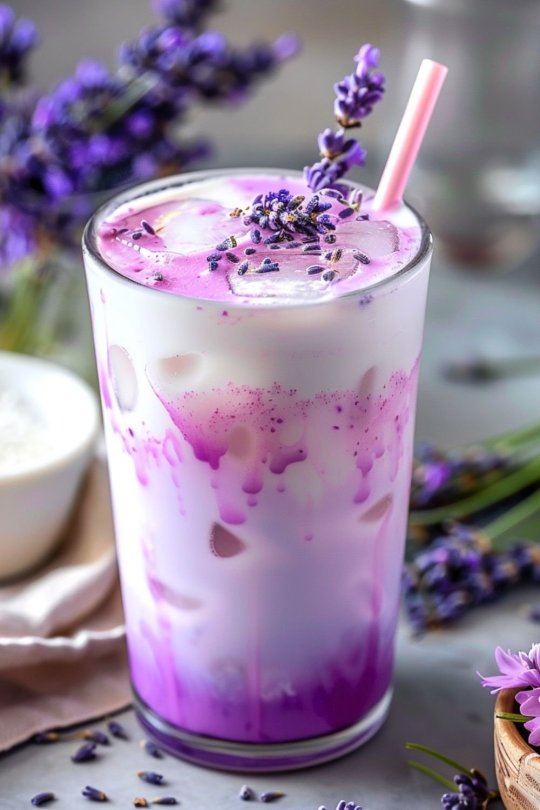
Lavender milk tea
#tea#lavender#flowers#drinks#food#food and drink#milk tea#milk#vegan#iced tea#beverage#sweet food#sweet#tasty#foodporn#delicious#cooking#food photography#foodgasm#recipes
677 notes
·
View notes
Text
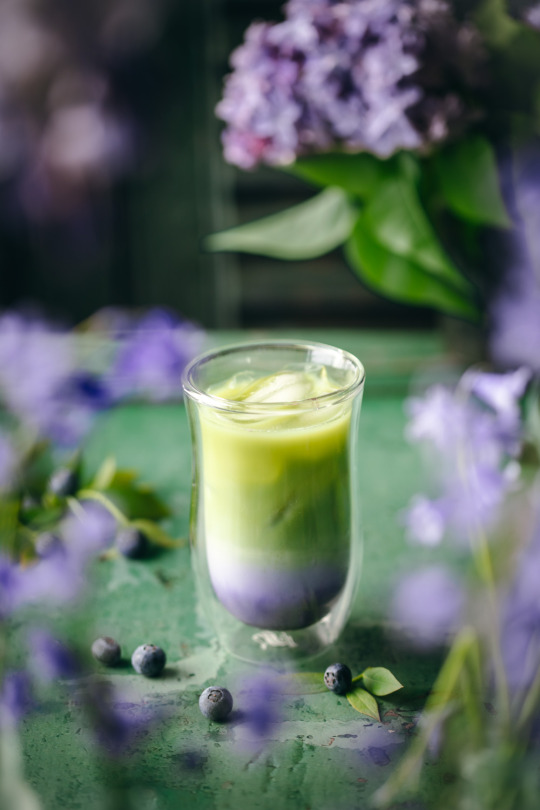
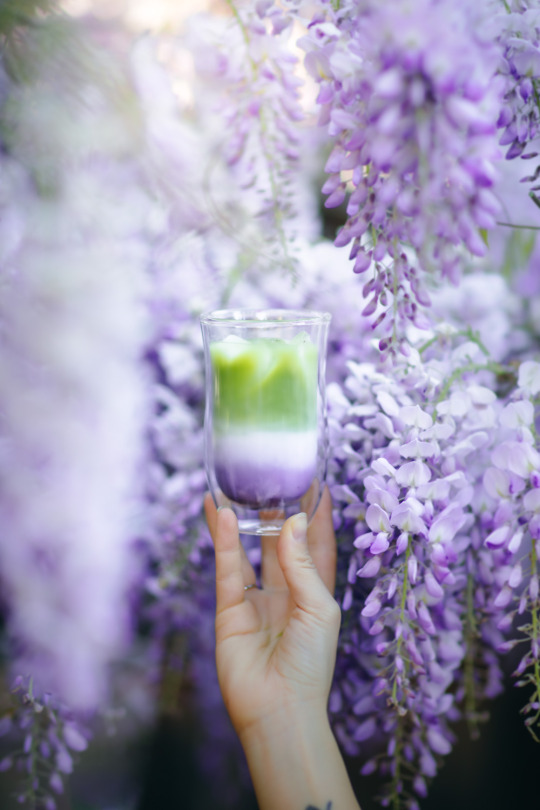
Blueberry Green Tea Latte
465 notes
·
View notes
Text
Perfect Vanilla Tea
Ingredients 1 cup boiling water 1 orange pekoe tea bag 2 tablespoons milk 1 teaspoon white sugar ½ teaspoon vanilla extract ½ teaspoon ground cinnamon Directions 1. Pour boiling water into a mug. Steep tea bag in water for 3 minutes; remove and discard. 2. Stir milk, sugar, vanilla extract, and cinnamon into the tea.
0 notes
Text
My partner and I went through this last batch in record time, and I will have to make some more next week.
Kitchen Witchery: Elminx's Anti-anxietea

In honor of eclipse season, I wanted to share a recipe to bring your buzz down a notch (or two). I've been drinking this nervine tea for nearly five years now; it features all of my favorite herbal flavors! I'm not going to go into detailed herbal profiles for each of these botanicals, but I suggest looking into them more if you are curious. I think learning the basics of herbalism can greatly benefit the kitchen witch.
Each of these ingredients can be found in any decent grocery store, bought online, or grown yourself. The combination is designed with flavor and herbal actions in mind; it's not a measure of exact ingredients - mix with your heart. All of these botanicals are well tolerated and can be drunk regularly by most people. Please be careful when trying new herbs; allergic or other adverse reactions can occur.

Hibiscus, Hibiscus sabdariffa Hibiscus is the primary flavoring agent in this blend. It gives our tea its Cool, Moist, and Sour properties. Please keep in mind that hibiscus will stain anything it comes into contact with, including clothing, wooden spoons, and even countertops. If you don't think you're familiar with hibiscus, it is the primary flavor in all "Zinger" teas. It tastes tart and inexplicably red.
Peppermint, Mentha piperito
Peppermint is the first of our gentle nervines to be added to our tea. Nervines do exactly what you expect them to: they calm your nerves. In addition to being a nervine (primary benefit), Peppermint adds its properties of Pungent, Sweet, Cool, Warm, and Dry to our tea. I'm sure you're all familiar with peppermint; you could probably substitute a different mint here with similar effect.
Lemon Balm, Melissa officinalis
Lemon balm is a nervine and a mild sedative. It brings the properties of Sour, Cool, and Dry to our tea. Some people don't like the taste of lemon balm, saying that it tastes like Pledge. If that's you, just omit it from this drink. The taste of hibiscus strongly overpowers the lemon balm, though, so maybe try it first.
Tulsi (Holy Basil), Ocimun santum
Tulsi is a nervine and adaptogenic herb, which means that it helps the body manage stress better. Its properties are Pungent, Sweet, Bitter, and Warm. With its heady, peppery notes, Tulsi is certainly an acquired flavor. If you get along with this herb, you will know almost immediately upon drinking it for the first time. A little goes a long way; you don't need to overdo it.
Dried Apple, Malus sp.
Although apple is primarily a flavoring agent (and sometimes a sweetening agent) in this blend, it does have mild sedative effects that lend themselves to the overall feel of this tea. I suggest using the apples you would eat in this recipe; you can dry slices of apples by putting them in your oven at 225F for 1.5 to 2 hours. Use a sweeter apple if you want a sweeter tea.

Minx's Anti-Anxietea
2 parts hibiscus
1 part peppermint
1 part lemon balm
1-2 parts dried apple
.5 part tulsi
Start by adding 1 tsp tea to hot water and steeping for 8 minutes. Adjust to your tastes from there.
This drink tastes great, hot or cold.
I've never sweetened this tea because I like my drinks bitter like my soul, but I bet a dollop of honey would be lovely in this—especially a nice summery wildflower honey. I've added sweetened cranberries in the past (1-2 parts) for more sweetness. And honestly, I don't measure. I know when it smells right.
I apply this drink liberally, but some people may find it too strong a diuretic to consume more than once daily. I drink it any time that I feel especially anxious or when I know I am going to be under a lot of stress. My partner likes to drink it before bedtime and claims it's one of the only things that will calm them down when they feel like they have too many thoughts.
You can witch this up (it's a verb now!) as little or as much as you like. I like to work calming energy into the drink step by step as I create the mixture by working with each botanical individually. You could charge this with a candle or sigil, dedicate it to one of your favorite gods or spirits, or store it on your altar. I create bindrunes for my favorite tea blends and use them as magical labels.
Do you like my work? You can tip me over on Kofi or sign up to be a monthly supporter of my writing.
64 notes
·
View notes
Text
Tropes in manhwa are awful yet people still defend them
I'm in a bad mood right now so what better way to release all that pent up anger by ranting on what can ruin a good story.
1: Slavery being inserted only for cheap plot and slaves being demonized as obsessive/greedy monsters for "not knowing their place"

Theres nothing wrong with wanting to insert slavery in your story AS LONG as it's not just cheap plot to make your MC look "better" by buying from a single to all of the slaves because let me tell you this: there is no such thing as a good slave owner, you cannot morally own another human being. A lot of manhwa like to have slavery be a part of their plot completely ignoring that just because the MC goes "wow this is terrible" doesn't make them a good person after they buy a slave.
Remarried empress does this with its villian Rashta by pushing the notion that she's being greedy for not wanting to stay in poverty so Navier won't suffer because apparently a slave wanting what the silver spoon mouthed nobles were born into is so terrible not to mention they justify slave owners and slavery in general as a punishment for criminals (neglecting the fact that children can be sold by their parents)
The villainess has fun again justifies a child slave being bought by the lead and he becomes an obsessive shouta love interest, fans continously justify by using the ancient lolicon excuse "he may look young but he's actually 99182823 years old!"
In divorcing my tyrant husband, Robelia buys 30 slaves and the only 2 that consistently show up have no other personality other then "we love you FL we will worship you till the end of time!"
There's a damn manhwa out there literally called the order of slave breeding and even when a story tries to do this correctly such as VADTD with Penelope being portrayed as a bad person for what she did to Eckles, fans have been so deluded by the idea that FL's buying slaves is "girlboss" that they think Eckles should be grateful to be Penelopes "pet"
2: ML's murdering innocent people after one guy hurts the FL

I already made a specific post about it before and I'll say it again: all this does is make your male lead/father figure look like a horrific monster. While you could say it's because its a medieval kingdom (objectively that is true that they would do this) manhwa and OI is the same place where despite in those times taking a mistress was considered normal they still view it as cheating and "how could you pick that slut when you have such a perfect wife!? 🤬" in most stories. So yes, modern morality is still inserted within these tropes. While I can get it's a way to show that the man in questions loves the FL so much he's willing to go to such lengths to protect her I think just mutilating the guy that actually did the sin would be enough because try imagining yourself as a faithful servant who was amazing at your job getting brutally slaughtered by the Emperor because your boss attacked his daughter or lover.
Into the light once again does this with Aishas dad murdering all the relatives and close friends of a count that tried to kill Ysis and Aisha, Aisha doesn't seem to care despite being in a situation where she was wrongfully executed in her past life.
Remarried empress does this too. After Navier is nearly killed by Krista's brother, Heinrey tortures and kills the dad and slaughters the servants of the zemensias. I can't remember if he also murdered the remaining family members but I wouldn't put it past him.
3: protagonist centered morality

Protagonist centered morality is the biggest indicator that a piece of media is dealing with a mary sue FL. Whatever the protagonist says is right is immediately morally correct. This is actually used to justify the last 2 examples with "it was for the FL!" Things like slavery, murder, workplace abuse, union busting, pedophilia, and being a POS to your loved ones are all justified if the protagonist finds a cheap way to justify it and you HAVE to agree with her because her backstory is very tragic 🥺. Protagonist centered morality also ruins the chance for good characters since the FL herself never has to grow as a person so she stays the same exact thing as she was just with more enablers and random characters will be treated as villains even if they aren't actually wrong about being suspicious of the Protagonist or calling out her behavior. It twists the narrative in such incomprehensible ways that you don't even know what your reading anymore. I can't even list all of the manhwas that do this given how many there actually are so I'll just list some that are at least self aware there Protagonist is awful/morally grey or isn't even a bad person but they still have flaws that can be pointed out
Villains are destined to die
My in laws are obsessed with me
Not sew wicked step mom
Depths of malice
The villainess turns the hourglass
Beware of the villainess.
4: villains being dumbed down to make the lead look smarter

This is unfortunately another common staple often used as a quick way to make the FL look smart and witty but is that really hard to look smarter when everyone else around you is an idiot? Not only does the FL not have to put in actual effort to best her enemies but you just start to pity the villain for basically being a punching bag. Dimwitted villains aren't always bad in fact they can be some of those most entertaining characters no matter much they lose but that only works when they are meant to be seen as a goofy character that your not supposed to take seriously. Villains that are written as extremely childish and stupid but your still supposed to treat them as serious antagonists on the other hand are just annoying since you wonder how the protagonist even got killed by them in the first life if they're so stupid.
Isabella de Mare while admitly having a good reason for being dumbed down (she's a teenager in the 2nd life so it's reasonable she wouldnt be as smart as her adult counterpart) is still a joke of a villainess who keeps flipping back and fourth from a snot nosed whiny brat to a mastermind only at convenient opportunities when the plot needs conflict.
Mielle from the villainess turns the hourglass was first portrayed as extremely conniving as she arranged for Arias downfall in the shadows but in the second life she fails at every scheme she has even though she has Emma and Isis to help her out.
Ragibach is a literal demon possessing the body of another woman with the goal of setting demons loose on the word to start another human vs demon war and she succeeded in that the first time, the devastation was all there so clearly she has to be a formidable antagonist right? Well no, she's another case of being dumbed down further and further so Keira can succeed and while they do understand some plot holes such as Ludwig not trusting her as much in the second life it doesn't change the drastic character change from evil genius to bumbling idiot.
In short: dumbing down your villains so your lead can look smarter is essentially going to give the equivalent of a hydrogen bomb vs a coughing baby.
5: feminine women being demonized as basic "other girls" sluts

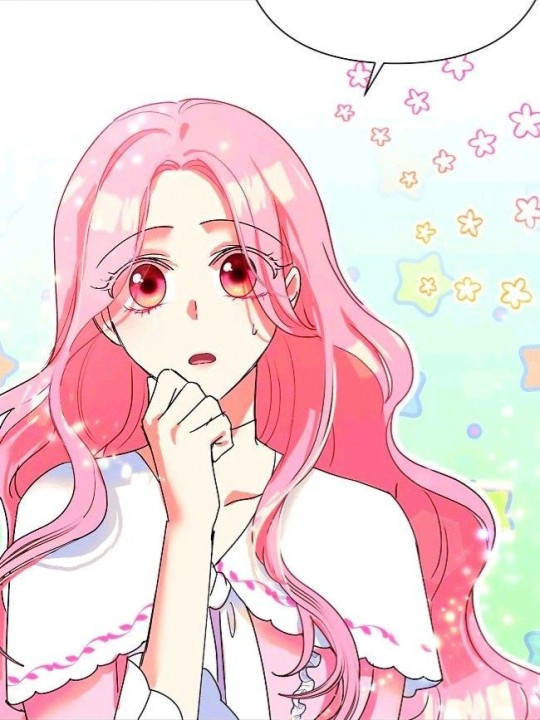

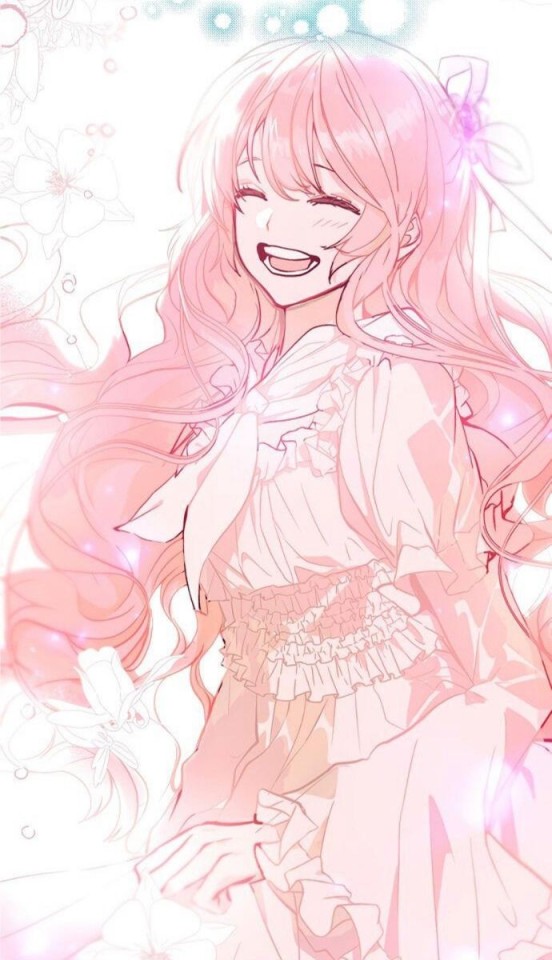
Okay this one isn't nearly as terrible as the others on this list because we all love the good old "a demon makes itself look beautiful to deceive humans" kind of villain, in fact as you probably know by me by now, white lotuses are my favorite kinds of character and even in media outside of manhwa I always find myself drawn to angelic villains but it seems like this is less of that and more of "Oh those are all the other girls who just want a man to save them, look at how much better my badass rich boss babe is for working for herself while taking all of their men at the time 😎" in manhwa. As soon as a traditionally feminine girl shows up, comments are already calling her a two faced bitch and half the time protagonist is already skeptical of her. This is the opposite of what being a feminist really is, a real feminist wouldn't be putting down other women just because they dress with more pink with bows and skirts and while I do think for most manhwa this is unintentional I do wish that we could have more characters like Psyche, Helena, Athy, and Jennette that prove that being overly feminine doesn't make you a backpedal on feminism. This doesn't make the badass or sexy fl's bad either, it just means they can co-exist.
An angelic villain should be treated as evil for being a well calculated schemer, not because they have a light colored color scheme
6: toxic relationships being romanticized as good

You know for a large community that claims to be about girl code a good chunk sure likes to look the other way when it comes to toxic relationships as long as the abuser is "hot" and theres always the terrible excuse such as "he has trauma!" Or "he doesn't know how to show his love normally!" No just no we aren't doing that here. Cry or better yet beg has this problem with not only the narrative claiming that Matthias graping Layla is okay because she actually loves him and doesn't know it but a large part of the fanbase also defends it, the same goes with try begging, a manhwa written by Solche who also wrote cry or better yet beg and once again despite Leon being an abuser everyone's ready to justify his actions because he's just a soft little boy who ends up falling in love with Grace awww 😍 (what the hell?) Everyones all about not justifying abusers because they had a sad past until it's the "sexy" male leads with daddy issues.
7: maid slapping
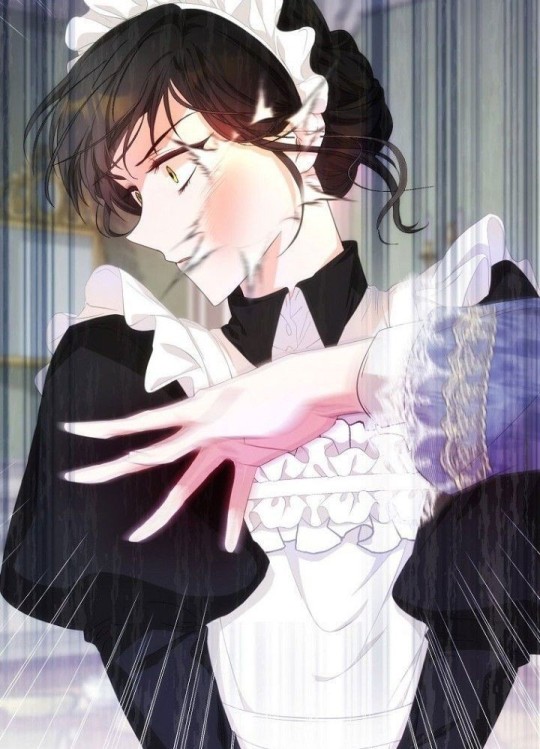
This shit isn't asserting your dominance as a boss bitch it's just work place abuse. This trope has gotten so out of hand of being justified by narratives and readers that there is an entire webtoon called this isekai maid is forming a union that's all about criticizing twisted manhwa tropes that get brushed off with maid absuer being at the biggest one. It's funny because a lot of people complain that Isekai maid union villainizes the nobles too much but they never ask the same questions when a OI is demonizing maids as greedy and lazy in order to deserve a beating. This doesn't just stop at hands either it can escalate to threats of mutilation just to assert dominice which is absolutely sick. Most of the time these leads used to be office workers or terminally ill patients, they know how terrible it is to be treated like garbage by their superiors yet they continue to absue every maid who isn't getting on their knees for them. Most maids in real history would not mistreat a noble even if they were the most hated in the house and even if they did they'd be fired without a letter of recommendation so why can't the FL's just fire the rude maid if they care about dignity so much because I'm pretty sure getting violent with a maid isn't very dignified either.
8: disgusting age gaps
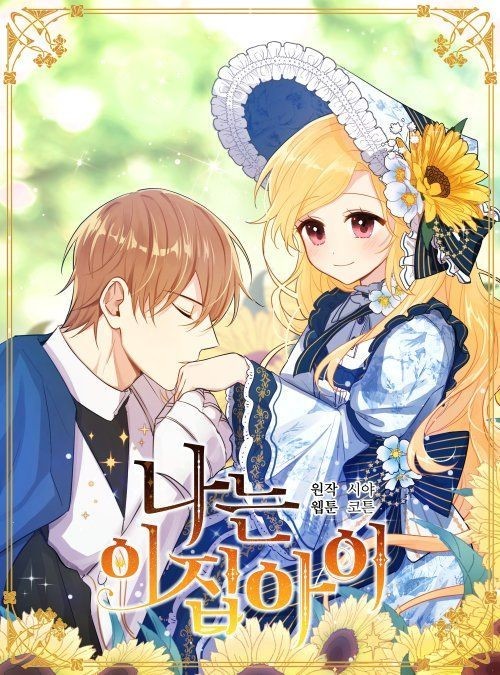
Very similar to #6 but in this case while the ML/FL isn't a cruel monster to their partner it doesn't change the fact that grooming and pedophilia is still a crime worthy of life in prison. You'd think "oh no way, this can't be justified can it?" You'd be wrong. Now I belong to house of Castillo thankfully has a larger fanbase of people who think that a relationship between a girl who got groomed by her knight is bad but in cases like into the light once again a lot of people like to say "Well Aisha is technically 28 so it's fine!" When it really isn't since Aisha is still mentally 14. Taming my ex husbands mad dog is another one that does this with Reinhardt grooming a 16 year old boy and its apparently meant to be "cute".
9: claiming a character as unattractive yet giving them a perfect body and appreance

I just think this is a major cop-out since there's time where they want to make a realistic story yet also wanting a fantasy fufilment. I don't think its a coincidence that the only woman in tears of a withered flower that yout supposed to support is a Victoria's secret model body type. Even though she's meant to be an overworked exhausted 33 year old woman being mocked for losing her beauty she sure as hell isn't drawn that way, the only other women around hae soo are all women with smaller boob's and in general more common body types that are either classed as stupid or jealous that Hae soo is so beautiful that all the attractive men want her



how about we don't pit all the women against each other for once? And let's especially not villainize other women because their jealous they could never be have large boob's and tiny arms+waist at the same time?
10: the commoner protagonist actually being a noble rich person all along

Look I know most of us had loved those "the hated child is the lost princess" GLMM but we need to drop it because it's kinda disappointing that the nobody who had to work their way to the top is actually a secret magical princess who had royal blood in them all along. While I did think the villainess turns the hourglass was a pretty decent read I was super disappointed finding out that Aria was of noble descent all along. I liked seeing a commoner protagonist for once and it really felt like it was critiquing the idea that all commoners and poor people who want nice things like the nobility are greedy animals. Something similar can also happen with certain saintess manhwas that decide to twist itself into "the villainess was the true saintess all along!" And I'm just sitting here thinking "well there goes the hope that you didn't need the super duper rare power to be a strong character"
I feel way better now after writing all this.
#manhwa#webtoon#tapas#sister i am the queen in this life#actually i was the real one#the remarried empress#the remarried empress critical#into the light once again#i belong to house castillo#today the villainess has fun again#the villainess reverses the hourglass#tears on a withered flower#marry my husband#50 tea recipes of the duchess#cry or better yet beg#try begging#tropes#bad tropes#this isekai maid is forming a union#divorcing my tyrant husband#villains are destined to die#death is the only ending for a villainess
767 notes
·
View notes